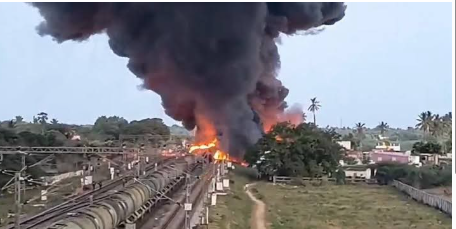

Chennai, July 13: A major fire broke out early Sunday morning on a diesel-laden goods train near Tiruvallur in Tamil Nadu, gutting 18 wagons and disrupting rail traffic on the busy Chennai-Arakkonam route. The blaze, which began around 5:30 a.m., was brought under control after nearly seven hours of intense firefighting.
The train was transporting 12.6 lakh litres of diesel in 18 tanker wagons, each carrying about 70,000 litres. All 18 wagons were destroyed, resulting in the loss of fuel worth approximately ₹12 crore.
Southern Railway, in an official release, stated that the fire is suspected to have originated in the third wagon just as the train departed Tiruvallur station. The loco pilot quickly applied emergency brakes, and the station master promptly cut off overhead electric power. Despite these measures, the flames rapidly spread to the 19th wagon, causing derailments and extensive damage.
Dramatic visuals from the site showed the wagons reduced to a row of charred shells. Fortunately, the locomotive and 30 unaffected wagons were detached and safely moved away. No casualties were reported.
Train services were severely hit, with at least 12 trains to and from Chennai Central either cancelled or short-terminated. Several others were diverted. Authorities arranged alternative transport for stranded passengers, including Metropolitan Transport Corporation (MTC) buses.
Southern Railway General Manager R.N. Singh visited the site to inspect the damage and oversee restoration efforts. Officials expect the DOWN line toward Bengaluru and Mangaluru via Jolarpettai to be restored shortly.
Meanwhile, three special investigation teams led by the Additional Director General of the Railway Protection Force (RPF) have been formed to probe the incident. Preliminary inquiries are focusing on potential technical faults or lapses in safety procedures during fuel transport.
The incident has raised serious concerns about the handling of hazardous materials on Indian Railways, prompting renewed calls for a comprehensive review of safety protocols.